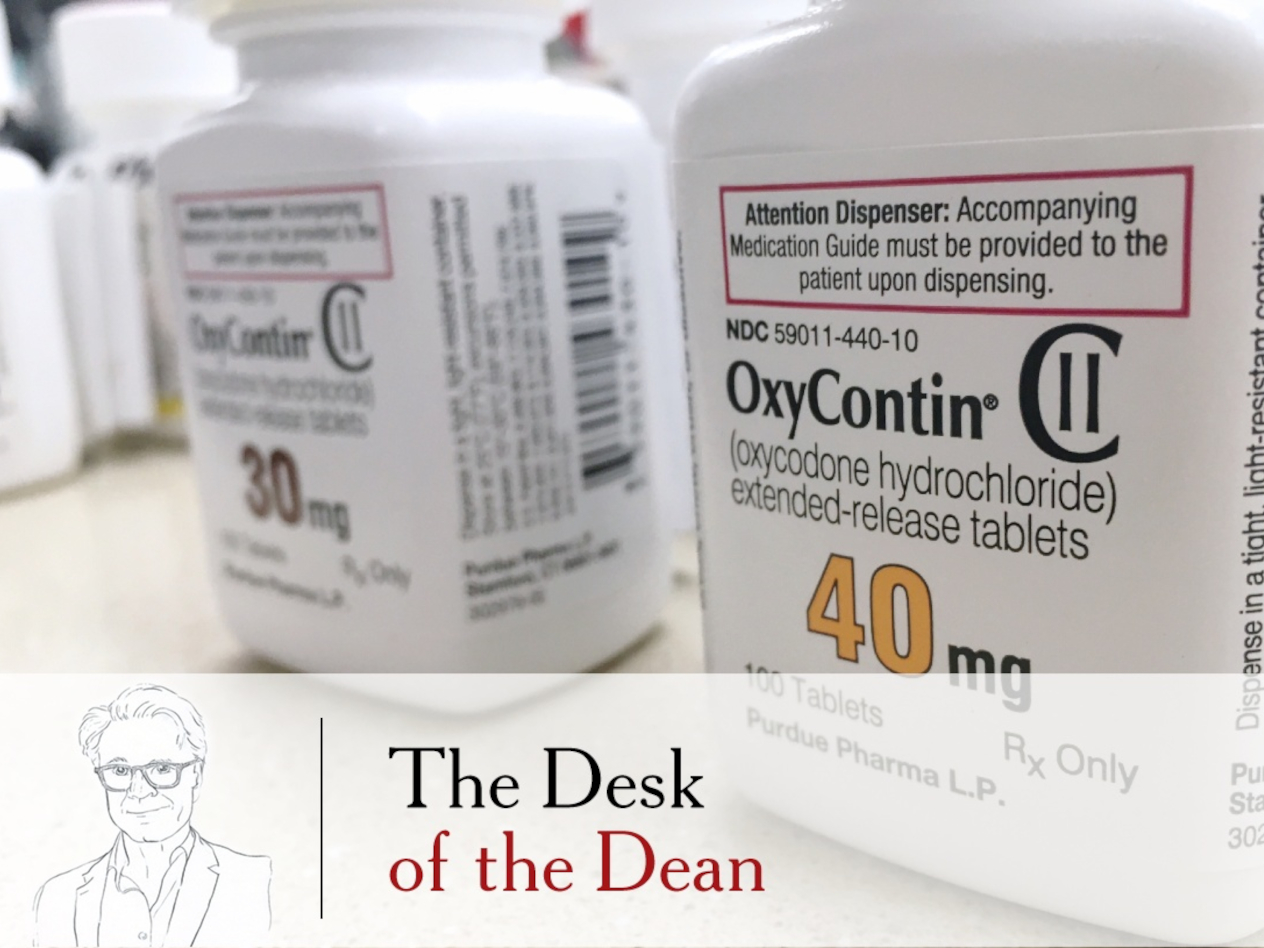Bellwether grant sparks new Olin Brookings initiative focused on opioid epidemic
- April 7, 2021
- By Mark Taylor
- 4 minute read

Suppose the epidemic of opioids plaguing the United States could be stopped at the source? Suppose 21st century technologies such as data mining, artificial intelligence and machine learning could flag risky drug shipments before they land in the hands of at-risk populations?
How could it be done? And what changes in local, state and federal policy would be required to curb the problem and sharpen the response from experts in law enforcement, public health and industry?
These questions form the heart of a new initiative between WashU Olin Business School and the Brookings Institution. Broadly speaking, the Olin Brookings Commission is a three-year initiative designed to recruit a dream-team of policy experts and scholars each year who will deeply analyze a single major policy issue and issue policy recommendations.
Made possible by a $750,000 grant from The Bellwether Foundation Inc., each commission will be charged with tackling topics affecting the quality of life for people in St. Louis and across the country. Each year’s panel will issue practical and realistic recommendations informing business strategy and public policy.
“We are pleased to provide multiyear support for the Olin Brookings Commission,” said Ginger Smith, president of The Bellwether Foundation. “Funding an initiative that deepens the partnership between Olin and Brookings, two leaders in their industries, is where we believe we can make an impact.”
The focus of our first commission
Our first commission convenes this month. This first six-member commission—in partnership with Olin’s Center for Analytics and Business Insights—will demonstrate how new technologies can curb opioid trafficking and potentially more than 100 other equally destructive examples of illicit trafficking.
At the same time, the commission will evaluate existing policy obstacles and reveal opportunities where policy changes can enable industry and government to implement a real-time detection and alert system across industry and government agencies.
“The initiative is very compelling. It leverages new advances in artificial intelligence and machine learning to proactively detect suspicious opioid orders before they are shipped,” said Anthony Sardella, chair of the first commission and founder of data insight firm evolve24. “This effort holds the promise to save lives, enhance public health and protect our vulnerable populations.”
An initial phase of the opioid research project involves mining a relatively new database from the US Drug Enforcement Agency: the Automated Reports and Consolidated Ordering System. CABI co-directors Seethu Seetharaman and Michael Wall, along with Tony (who also serves as CABI’s senior research advisor), will lead the data analysis portion of the project.
“I am excited that CABI is involved in such a high-stakes national policy-related initiative in terms of showcasing the analytics talent resident in Washington University in St. Louis,” Seethu said. “This could not fit more perfectly with the values-based, data-driven mission of Olin.”
Another key component of the Olin Brookings Commission is involvement from students, who will serve as “commission fellows” in research and logistical support for each project. Olin PhD marketing student Annie Shi will collaborate with Tony, Michael and Seethu and together, they will be co-authors on all publications that arise from this initiative.
Meanwhile, I’m pleased to announce that our first commission includes heavy hitters from the pharmaceutical industry, academia, law enforcement and advocacy organizations focused on drug policy. Find the list of commission members at the bottom of this column.
A signature program?
The Bellwether grant makes possible a long-held vision of mine, an extraordinary opportunity to further leverage and expand Olin’s powerful relationship with Brookings, while also convening thought leaders who can provide guidance and direction on “megatrends” in global business and public policy.
We envision that each commission’s report—targeting the White House, regional and national government policymakers and the media—would coincide with the springtime Olin MBA capstone experience with Brookings. That is our timeline for a report on the opioid project.
Commission members will convene in a series of virtual meetings—at least while the pandemic continues raging—over the course of this year.
In addition to recommendations influencing business practice and public policy, the initiative is structured to provide insightful, well-researched contributions to industry about societal megatrends, inform and influence the direction of future research and increase students’ knowledge about the confluence of business and public policy.
I’m confident that the Olin Brookings Commission can become one of Olin’s signature programs, further cementing our commitment to improving life in St. Louis—and changing the world, for good.
Members of commission No. 1, opioid trafficking
- Anthony Sardella, founder, evolve24; faculty member, WashU Olin Business School. Commission chair.
- The Hon. Mary Bono, board member, Community Anti-Drug Coalitions of America, former US representative.
- Dr. Ann Marie Dale, assistant professor of medicine and occupational therapy, Washington University School of Medicine
- Van Ingram, executive director, Kentucky Office of Drug Control
- Gina Papush, global chief data and analytics officer, Cigna.
- Darrell M. West, vice president and director, Governance Studies; senior fellow, Center for Technology Innovation, Brookings
Media inquiries
For assistance with media inquiries and to find faculty experts, please contact Washington University Marketing & Communications.
Monday–Friday, 8:30 to 5 p.m.
Sara Savat
Senior News Director, Business and Social Sciences
